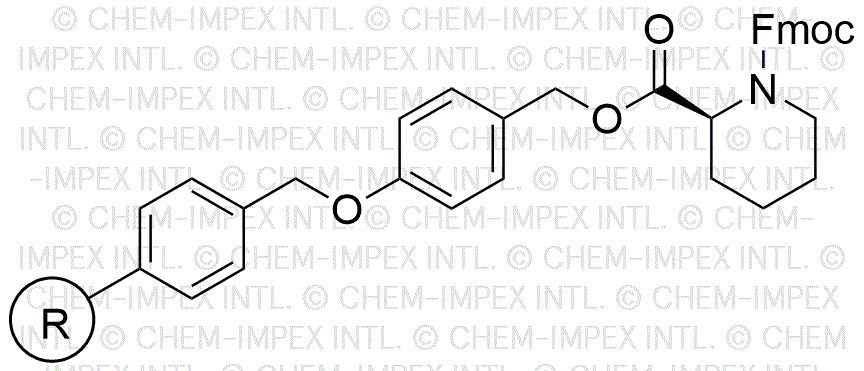Fmoc-L-pipecolic acid 4-alkoxybenzyl alcohol resin is widely utilized in research focused on:
- Peptide Synthesis: This resin is crucial for solid-phase peptide synthesis, allowing researchers to efficiently create peptides with high purity and yield.
- Drug Development: It serves as a building block in the synthesis of bioactive compounds, aiding pharmaceutical researchers in developing new drugs.
- Bioconjugation: The resin can be used to attach various biomolecules, enhancing the functionality of therapeutic agents in targeted drug delivery systems.
- Material Science: It plays a role in creating novel materials with specific properties, useful in developing sensors or drug delivery systems.
- Research in Neuroscience: The compound is valuable for synthesizing neuroactive peptides, contributing to studies on neurological disorders and potential treatments.
Informations générales
Propriétés
Sécurité et réglementation
Applications
Fmoc-L-pipecolic acid 4-alkoxybenzyl alcohol resin is widely utilized in research focused on:
- Peptide Synthesis: This resin is crucial for solid-phase peptide synthesis, allowing researchers to efficiently create peptides with high purity and yield.
- Drug Development: It serves as a building block in the synthesis of bioactive compounds, aiding pharmaceutical researchers in developing new drugs.
- Bioconjugation: The resin can be used to attach various biomolecules, enhancing the functionality of therapeutic agents in targeted drug delivery systems.
- Material Science: It plays a role in creating novel materials with specific properties, useful in developing sensors or drug delivery systems.
- Research in Neuroscience: The compound is valuable for synthesizing neuroactive peptides, contributing to studies on neurological disorders and potential treatments.
Documents
Fiches de données de sécurité (FDS)
La FDS fournit des informations de sécurité complètes sur la manipulation, le stockage et l’élimination du produit.
Spécifications du produit (PS)
Le PS fournit une description complète des propriétés du produit, notamment sa composition chimique, son état physique, sa pureté et les exigences de stockage. Il détaille également les plages de qualité acceptables et les applications prévues du produit.
Certificats d'analyse (COA)
Recherchez des certificats d'analyse (COA) en saisissant le numéro de lot du produit. Les numéros de lot et de lot se trouvent sur l'étiquette d'un produit, après les mots « Lot » ou « Lot de fabrication ».
Numéro de catalogue
Numéro de lot/série
Certificats d'origine (COO)
Ce certificat d'exploitation confirme le pays dans lequel le produit a été fabriqué, et détaille également les matériaux et composants utilisés et s'il est issu de sources naturelles, synthétiques ou autres sources spécifiques. Ce certificat peut être requis pour les douanes, le commerce et la conformité réglementaire.
Numéro de catalogue
Numéro de lot/série
Fiches de données de sécurité (FDS)
La FDS fournit des informations de sécurité complètes sur la manipulation, le stockage et l’élimination du produit.
DownloadSpécifications du produit (PS)
Le PS fournit une description complète des propriétés du produit, notamment sa composition chimique, son état physique, sa pureté et les exigences de stockage. Il détaille également les plages de qualité acceptables et les applications prévues du produit.
DownloadCertificats d'analyse (COA)
Recherchez des certificats d'analyse (COA) en saisissant le numéro de lot du produit. Les numéros de lot et de lot se trouvent sur l'étiquette d'un produit, après les mots « Lot » ou « Lot de fabrication ».
Numéro de catalogue
Numéro de lot/série
Certificats d'origine (COO)
Ce certificat d'exploitation confirme le pays dans lequel le produit a été fabriqué, et détaille également les matériaux et composants utilisés et s'il est issu de sources naturelles, synthétiques ou autres sources spécifiques. Ce certificat peut être requis pour les douanes, le commerce et la conformité réglementaire.

